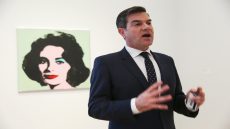The Eurovision Song Contest continues to captivate global audiences, with its rich history of unforgettable performances and surprising winners. One such moment occurred on May 17, 2025, when fans reminisced about Celine Dion’s iconic 1988 victory representing Switzerland. Dion’s win not only showcased her talent but also highlighted the unique nature of the contest, where artists can represent countries outside their own.
- Celine Dion won Eurovision for Switzerland in 1988.
- The song "Ne Partez Pas Sans Moi" was performed.
- Dion found the song "too pompous."
- She began a romance with René Angélil afterward.
- The song remains a fan favorite today.
- Dion's English debut album "Unison" followed in 1990.
In Dublin, Dion performed “Ne Partez Pas Sans Moi,” a song that remains a fan favorite despite her initial reservations about its pompous style. This victory marked a pivotal moment in her career, paving the way for her future global success. As Eurovision enthusiasts eagerly anticipate this year’s final, many wonder if Dion might make a surprise appearance.
This reflection on Dion’s Eurovision journey raises intriguing questions about the contest’s evolving nature. How do such historical moments shape the careers of artists today? And what does this mean for future Eurovision contestants? Consider these key points:
- Dion’s win remains the last French-language entry to secure victory.
- Her success helped broaden her appeal beyond French-speaking audiences.
- Eurovision continues to embrace diverse musical styles and cultural representations.
- Fans are eagerly speculating about surprise appearances at this year’s event.
As the entertainment landscape evolves, events like Eurovision remind US of the power of music to unite diverse cultures. Will we see more artists like Dion emerge from the contest in the future?

































